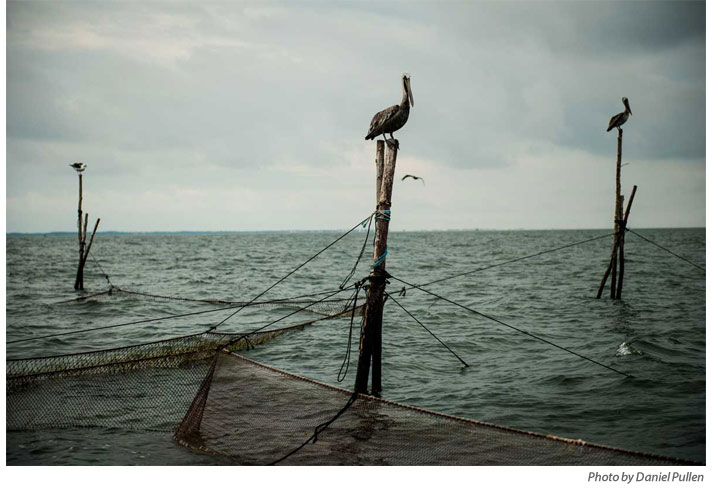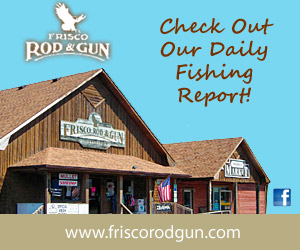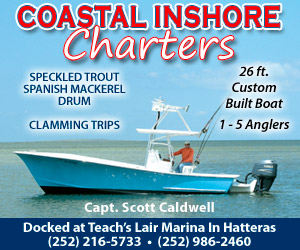Watermen are up in arms about a proposal that could restrict commercial fishing licenses to people who earn half their income from fishing, fulfill at least three dozen trip tickets annually and provide $10,000 a year per crew. Otherwise, they could be kicked into an inactive pool.
“Those who do not meet the qualifications will be wiped out,” says Hatteras charter boat captain Ernie Foster. “Coastal fishing communities all will suffer because of this.”
At the November meeting of the North Carolina Marine Fisheries Commission in Kitty Hawk, member Chuck Laughridge made a motion for the commission to “develop a definition of a commercial fisherman.” An ad hoc committee of three commission members later met to hammer out the proposed standards. The committee recommendation will be presented to the full commission at its Feb. 14-15 meeting in Wrightsville Beach.
Foster, owner of the Albatross Fleet, said that about 15 percent of his gross income this year was from commercial fishing. Many others also fish to supplement their income, depending on opportunity and circumstances.
Fishing is hardly nine-to-five work, and on the Outer Banks, it is likely to be one of several things people do to piece together a living.
“One of the reasons commercial fishing is not more full-time is the weather,” Foster said. Then there is the seasonal nature of the fisheries, as well as gear requirements, regulatory restrictions, quota shutdowns, and the costs of fuel and maintaining a boat. “There are multiple variables,” he said.
The Dare County Board of Commissioners unanimously adopted a resolution at its Jan. 22 meeting opposing any change of the definition of commercial fishing.
Sammy Corbett, chairman of the Fisheries Commission for about four years, said he is hearing plenty of outcry from the commercial fishing community about the proposal.
“I’ve probably had 100 calls, most against it,” the chairman said in a telephone interview. “A lot of charter boat guys are against it, too, so it’s a pretty hot topic.”
Corbett, a lifelong commercial fisherman who represents the industry on the commission, said that the panel responded to a similar request from state legislators in 2016, but nothing came of it. More recently, he said that a group of people again broached the subject with lawmakers.
“I just know I’ve had three or four emails from legislators that we look at this again,” he said. After consulting with commission staff, it was decided to appoint a committee of three members: himself, Laughridge and Mike Wicker.
The commission will send its recommendation to the legislature, where it will be acted on, put on a shelf, or die.
Although Corbett said he understands why people are upset, he also has to represent all license holders and what is best for the industry and the resources. He said he has heard concerns about recreational fishermen abusing their commercial licenses to get around recreational bag limits, as well as criticism about the high number of inactive commercial licenses.
“To me, if you’ve got to have a definition to be a commercial fisherman, you have to sell a fish – that would be one trip ticket,” he said. “You’ve got to sell something, even if it’s one time. That’s part of the job.”
Of the 9,000 or so in the state’s capped pool of eligible standard commercial licenses, including retired, about 7,000 are actually issued, Corbett said. Of them, only about 3,000 licenses have a trip ticket. Fishermen can currently renew licenses that were held the previous year, otherwise the licenses are returned to a pool, from which non-holders can apply.
But he stressed that he “doesn’t want to see anybody making money commercial fishing go away.”
Corbett, who sets the commission’s agenda, said he made sure that an opportunity for public comment was provided in the evening on Feb. 14, before the commission considers the matter the following day. He said he is expecting a “whole lot of commercial fishermen showing up and raising Cain.”
“I guess we could call it the Valentine’s Day massacre,” he joked.
Bill Hitchcock, a fisheries and seafood advocate, said that attempts to narrow the definition of a commercial fishermen has been a tactic for years by groups such as the Coastal Conservation Association, a recreational fishing lobbying group.
In a brief telephone interview, Laughridge said he was advised by an attorney to resign from the group when he joined the commission. “I will not say I’m an active member,” he said. “I’m a life member of CCA.” He declined to comment further about the proposal.
Hitchcock said the Fisheries Commission had already studied the issue at length in 2010, when its Commercial License Review Taskforce – established to review concerns about availability and use – concluded that there was no need to change the definition of a commercial fisherman.
In general, he said, license holders – say, to operate a drone – once they meet the criteria, are not required to do a pre-determined amount of work to hold their license.
“That’s crazy,” Hitchcock said. “The end goal (of the CCA) is to reduce the numbers of commercial fishermen . . . This is a select few ardent anglers going against the seafood consumer.”
But such restrictions proposed by the committee would harm not only watermen, Foster said, but also all the businesses that support them and that they support, such as fish houses, marinas, tackle shops and restaurants. Commercial fishing, whether done part-time, full-time or overtime, is an essential part of the economic patchwork that is reality for many families.
“Everyone is besides themselves at the idea that a piece of our economy would be wiped out,” Foster said. “I have never heard any economist argue against financial diversification.”
On the Outer Banks, especially, there are limited opportunities to make a living, he added. And fishing is not only a traditional livelihood on the islands, it is its cultural heritage.
“The consequences of this for the present and future generations are very significant,” Foster said. “And there are no benefits to be derived.





